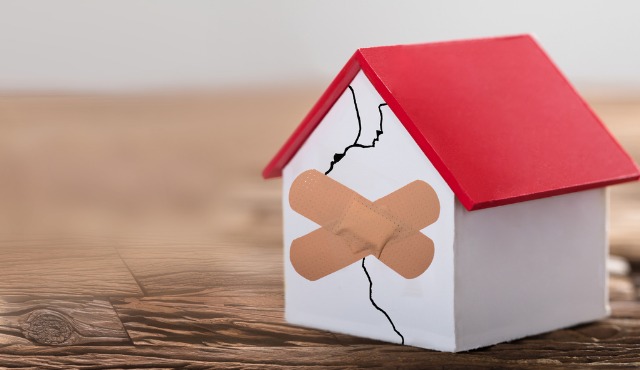By Anica Oaks
As a homeowner, the essential part of your property is its foundation. After all, this supports the above-ground structure and helps your family be safe. Even with proper maintenance, there can be issues that arise which require attention. By understanding how to recognize and address common problems with your home's foundation, you can ensure it stays stable for years to come—and save yourself costly repairs down the road. This blog post will help you learn how to detect signs of trouble in your home's foundation and the eps you can take if an issue arises.
What is a Home Foundation, and why is it essential to maintain it?
Your home's foundation base structure is made from solid materials like concrete or brick and mortar. It supports everything above, including the walls, floors, furniture, and family. Regularly inspecting and maintaining this all-important home component is essential for its long-term health. After all, if a foundation's integrity is compromised due to age or structural issues, you can be left with costly repairs that could've been avoided with routine upkeep. Knowing the signs that indicate it may be due for care (e.g., cracks in flooring or walls) can help keep the family in a safe and happy place to live.
Signs that there may be an issue with your foundation
It is essential to be aware of the signs that may indicate an issue with your foundation. Look for water damage, such as standing or pooling water near your foundation. Changes in wall structure or visible cracks, chips, and waves in walls can also be signs of foundation issues. Doors and windows within the house may become misaligned or stick when opened or closed, usually a sign of a weakening foundation. Additionally, floors may become uneven, sloping towards walls, indicating a disturbed alignment. Suppose any of these signs are present in your home. In that case, it is essential to have them looked at by a professional immediately since they could indicate more severe and costly issues if left unresolved.
- Cracking walls or floors. Cracking walls or floors can occur for many reasons, from normal settling to more severe issues such as foundation failure. Often these cracks are harmless and cause no lasting damage. However, it’s always a good idea to get any attempts checked by an expert who can correctly identify the source and severity of the issue. Sometimes simple measures like filling the crack with caulk can do the trick, but repairs might be necessary in other cases. Look out for signs like gaps in doorways or crooked walls that could indicate a more significant issue at hand. Don’t let cracking walls or floors become more significant problems; stay on top of visible signs and save time and money.
- Uneven floors. Small areas may still have minor imperfections even when your floor looks relatively even. Uneven floors can be caused by various factors, such as changes in weather and temperature, water damage, everyday wear and tear, and soil swelling or settling beneath the house. If left unchecked, these slight variations can create an uncomfortable environment while walking or running around your home! If you notice small bumps or dips in your floorboards, you can contact a professional to discuss whether you need to even out the floor. With their help, your home can remain safe and level over time!
- Doors that won't close properly. Have you ever been in a situation where you're trying to close a door that won't shut? It can be frustrating, but luckily there may be a simple solution. Often, doors that won't close properly can be fixed by adjusting the hinges or the strike plate, ensuring they stay aligned. You can also ensure proper closure if the floor needs leveling and raised or the frame needs tightening, as slight shifting can cause the door to no longer fit appropriately. Now you will have one less thing to worry about with those difficult-to-close doors!
Steps to take if you suspect there's an issue with your foundation.
Have you noticed cracks in your walls or doors not entirely closing right? If so, there could be an issue with your home's foundation. There are a few steps worth taking. First, you should consult a home inspector to see the situation. A professional eye can identify potential problems with the property and recommend a course of action if any foundation repairs need to be done. It’s also essential to address any issues from the inside out, starting with gutters and downspouts, to ensure water run-off is appropriately dealt with. If there’s evidence of drainage issues, get them sorted as soon as possible, as this could be a sign that moisture is getting beneath the foundation of your house and causing it to shift or settle unevenly. These simple steps can help give you peace of mind that any problem will be found quickly and dealt with sooner rather than later.
- Contact a structural engineer or home inspector. If you are considering any central home remodels or additional projects, it is essential to consult a structural engineer or home inspector to ensure the integrity of the building. Certified professionals can spot potential problems from afar and help tailor solutions that will be cost-effective and safe in the long run. They can also detect unsafe conditions such as water damage, moisture infiltration, termite infestations, and more, allowing homeowners to make timely repairs and protect themselves from future costly maintenance. Even if you're just curious about the condition of your home and want peace of mind, consulting a professional is one of the most intelligent decisions you can make for your wallet and your safety.
- Get an assessment of the damage and cost estimate for repairs. If your property has suffered from recent damage, then it can be a daunting task to fix the issue. A great way to get started is to request an assessment of the damage and a cost estimate for repairs. This helps you understand what needs fixing and how much it would cost. Make sure to obtain any quotes in writing so that you have a clear understanding of what the repair work entails. Additionally, confirm that anyone performing the repair work is licensed and insured. That way, you can feel secure knowing that experts do the repairs correctly and safely.
Tips for preventing further issues with your foundation
When it comes to maintaining the structural integrity of your home, preventing further issues with your foundation should be at the top of your list. A few simple steps are all it takes to help protect your investment. Always grade soil away from the structure and extend downspouts far away from the house. Diverting rainwater away from the foundation is especially important if you live in a region prone to heavy downpours or flooding. Additionally, take measures to keep your interior home stable by adding insulation and ensuring good ventilation for temperature control—this helps avoid any adverse effects on the foundation due to drastic swings in humidity and temperature. Making these small efforts will go a long way in protecting your foundation from future issues!
- Schedule regular inspections and maintenance of the foundation. It's essential to stay on top of your home's foundation and ensure it is in good condition. Regular inspections allow you to identify hidden issues you wouldn't otherwise notice. These could be the start of a bigger problem if addressed slowly. A maintenance schedule can help you keep tabs on the state of the foundation and ensure that any items found during the inspection are adequately taken care of. Regular inspections and maintenance will help protect the integrity of your home and provide a safe living for years to come.
- Ensure proper drainage around your house to avoid water pooling near the foundation. When it comes to maintaining your house, proper drainage is an essential element in preventing water damage or flooding. By ensuring that there is no pooling of water around the foundation of your home, you can significantly reduce the likelihood of costly repair bills. Check for clogged drains and ensure no vessels block runoff paths such as gutters or storm drains. Any accumulated snow around your home should be shoveled away, and there should be enough dirt and gravel surrounding the foundation to lessen the impact of rainwater. Taking the necessary measures to guarantee proper drainage will help protect your house now and in the future.
Financing options available for repairing foundations
Finding the right financing option when fixing a foundation can help make the repair more manageable. Homeowners’ insurance may cover some of the cost in certain circumstances, and grants may be available locally. If a loan is necessary, explore if your local bank or credit union offers home improvement loans or a line of credit designed explicitly for renovations. You may also be able to secure financing through specialized companies that specialize in home repairs. Researching these possibilities before starting your repair can save you time and money in the long run.
Ultimately, it's crucial to proactively maintain your home foundation to avoid structural damages and costly repairs. Schedule annual checkups for your foundation and take care of any necessary repairs as soon as possible. It’s also critical to watch for signs of a potential issue with your home foundation, such as cracked walls or floors, uneven floors, or doors that won't close properly. If you suspect a problem with your foundation, contact a professional to assess the damage and provide a repair cost estimate. Finally, remember that financial assistance is available—so don’t put off having needed repairs done. Although it may be tempting to delay those costly repairs, maintaining your home's foundation will guarantee your home's safety, security, and comfort in the long run.
 Anica Oaks is a freelance writer who hails from San Francisco, California. When she's not writing, she's enjoying her time outside with her dogs. Keep up with her on Twitter @anicaoaks.
Anica Oaks is a freelance writer who hails from San Francisco, California. When she's not writing, she's enjoying her time outside with her dogs. Keep up with her on Twitter @anicaoaks.








